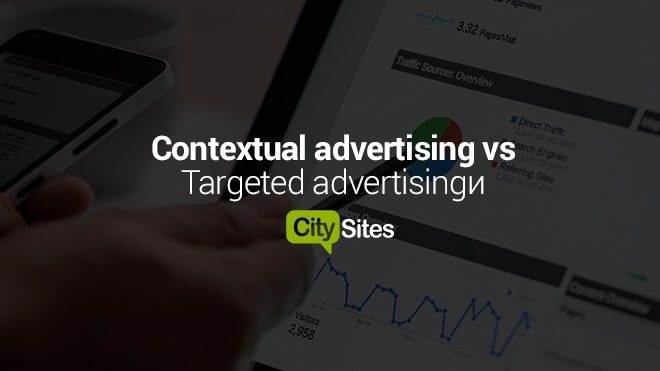Any company has a lot of advertising platforms today. An entrepreneur asks himself: “What advertising should I invest in?”, “How much?”, “What is the most effective?”. To find out the details, let’s compare contextual and targeted advertising, the most popular kinds of it. Even experienced businessmen confuse these two types, which puts them in a difficult position with the choice of the most effective advertising for their online resource.
Contextual advertising
Contextual advertising is a more advanced type of advertising that is configured using search engines, such as Bing, Google, where it is then shown. This type of advertising will be displayed according to the user’s search queries and won’t be shown to the "first comer" in the search results.

To understand correctly, let’s overview the advantages of contextual advertising:
- A fairly universal way of promotion. Suitable for most types of goods and services that have an online platform (website).
- Targeted. It is shown to the target audience only - users who are looking for a particular product or service. For example, the girl looks for “Winnipeg barbershop”, for this request, the advertised site will be displayed at the top/right of the search results, which lets the client open the page of the promoted salon.
- Pay for the result only. Payment is made "per click" on the ad, so there is no need to make unjustified investments. You pay only when the target customer clicks on your ad.
- An abundance of advertising settings. Creating an advertising campaign lets you edit it at any convenient time: change key requests, add/remove a budget, etc. So you get a flexible advertising tool.
- Wide coverage. For an advertising campaign, various keywords are added in a sufficiently large number for maximum results.
- Detailed statistics availability. At any time, you browse the number of transitions, the number of requests by words, budget, schedules, the dynamics of views, etc. This gives a complete understanding of the effectiveness of contextual advertising results.
Contextual advertising has several types:
- Search - the standard method in a search engine for key queries.
- Thematic - is provided on the pages of similar resources, for example, the user is looking for garden furniture, right where they can be shown ads and furniture for the hallway and others similar.
- Behavioral - a more sophisticated method. For example, a user was looking for a mobile phone yesterday, and today he went to buy an iron. Nevertheless, ad units will “pursue” him at the request “buy a smartphone”. This is the most modern, but also often “deliverable” form of contextual advertising, which can be disabled by the user.
Targeted advertising
Some advantages overlap with advantages of contextual advertising, we will not analyze them in detail. Here we have versatility, flexible settings, wide coverage. Distinctive points:
- You can use it even without any online resource.
- High level of trust: advertising is launched through social media, to which the user has a high level of trust today, respectively, and it comes with great enthusiasm.
- It shows not only the target audience but also potential customers who are at different levels of the decision to purchase. This is very important and pushes a new customer to purchase.
- Low start threshold. You can go with a minimum budget and already get to arrive. This is very convenient, especially for newly minted businessmen.
- Creative approach to writing ads. If you have creativity, don’t hesitate to use it to create an interesting advertisement, because the “key request” is not used here.

What should we use and when?
In some situations, targeted advertising is more effective, in others - contextual. And they don’t exclude each other! Everything can be combined to achieve maximum results.

Contextual ads are relevant in the cases following:
- Product or service is in demand
- The product is universal and there is no strict audience
- Unique offer
- Complicated service or product (for example, an online store of intimate goods)
- Not relevant product/service for social networks (selling a tractor)
- elite and expensive offerings
Targeted advertising would be appropriate if:
- The new product/service, for a particular region of the country or in general
- wide target audience (beauty industry)
- Art field activities
- Urgent sale through a social network
- Young people-oriented product/service
- Portrait of target customer is clearly defined

Both types of advertising, contextual and targeted, are relevant, but for different cases. In order to create your advertising campaign as competently as possible, you should contact the company, where experts will prompt and set up everything.

